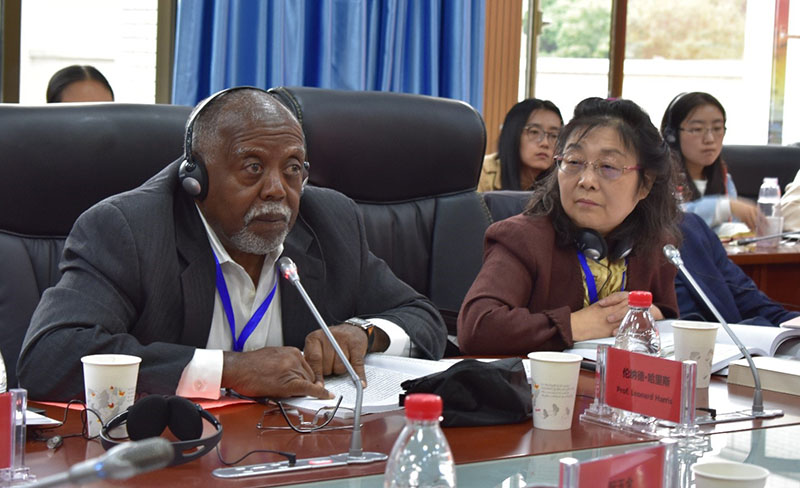It's our being that counts
Professor Leonard Harris argues that philosophical thought should always account for the least among us

It’s our being that counts.
Any effort to explain Leonard Harris’ conception of philosophy comes back to that basic premise.
“Rather than philosophy as dialog, the Socratic Method, rather than philosophy looking for distinctions and clarifications, definitions, rather than philosophy considering abstractions and foundational principles, I include those features in philosophy,” said Harris, a philosophy professor and Purdue faculty member since 1991. “But more importantly, philosophy should be born of struggle.”
That is, it should take into account the least among us – or as Harris describes them, “those who have been despised, degraded, those who have been self-deprecated.”
“We believe in America in punitive justice. We don’t believe in restorative justice,” said Harris, whose book outlining Harrisonian philosophy is scheduled to publish in 2021. “Punitive justice says you should hurt somebody if they do wrong. So who is going to get hurt more often than not? It’s the least well-off because we have a class divide, and that class divide cuts across race.”
Harris developed his personal orientation of philosophy – he calls it “Philosophy Born of Struggle” – after reading the words of noted abolitionist and orator Frederick Douglass. In his “West India Emancipation” speech in August 1857, Douglass said the following:
“Let me give you a word of the philosophy of reform. The whole history of the progress of human liberty shows that all concessions yet made to her august claims, have been born of earnest struggle. The conflict has been exciting, agitating, all-absorbing, and for the time being, putting all other tumults to silence. It must do this or it does nothing. If there is no struggle there is no progress. … This struggle may be a moral one, or it may be a physical one, and it may be both moral and physical, but it must be a struggle.”
More than a century later, Douglass’ words inspired Harris to rethink the boundaries of the field in which he worked, proposing a new normative approach.
“It gave me the idea that, look, I can do philosophy without being Socratic,” Harris said. “So I started looking at what counts as philosophy.”
This concept developed into a book, Philosophy Born of Struggle: Anthology of Afro-American Philosophy from 1917 (Kendall Hunt, 1984), a first-of-its-kind compilation that Harris compiled.
That led to an organization devoted to the topic, with conferences that meet annually. Since the first conference in 1994, presenters have included notable academics, authors, and thinkers like Cornel West, Angela Davis, Kwame Anthony Appiah, and Dorothy Roberts.
Several years ago, Harris donated all of the records of the Philosophy Born of Struggle conferences to Purdue, which now holds them in its archives.
“It’s one of the largest repositories of philosophers engaging in debates and lectures and presenting their views about issues of ethnicity and race,” Harris said.
Harris presents in his theory the “necro-being,” a condition that kills and prevents birth, arguing that there is no logical rationale that explains racism.
“What fundamentally is wrong with racism more than any other thing is that it kills,” Harris said. “It destroys life, prevents it from being born. There’s no moral theory on my account which can justify that undue result.”
Harris’ philosophical theories have led to numerous invitations to speak around the globe – including engagements in China, India, South Africa, and Ethiopia – and an association with UNESCO, the United Nations Education, Scientific, and Cultural Organization.
Harris organized the UNESCO Philosophical Dialogue Between Africa and the Americas at Purdue in 2011 and for several years was a member of the U.S. National Commission for UNESCO along with representatives of non-governmental organizations, government officials, and state and local community representatives.
While he points out that he did not work with UNESCO to “bang down doors” or write resolutions, Harris attends many difference conferences in order to share perspectives that should be heard – both inside and outside the philosophical realm.
His signature concept, of course, is to consider those whose fortune otherwise might not be considered at all.
“It’s not worth it if it doesn’t include a standpoint that tells you, take account of the least-well-off, the least among us,” Harris said. “How you do that and what you say about it, they are not to be ignored.”